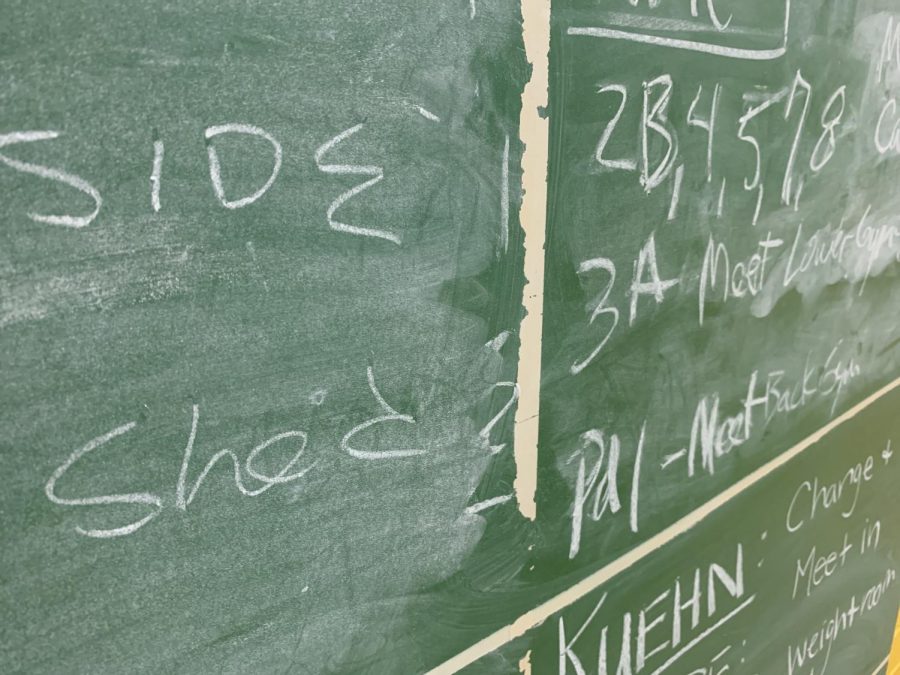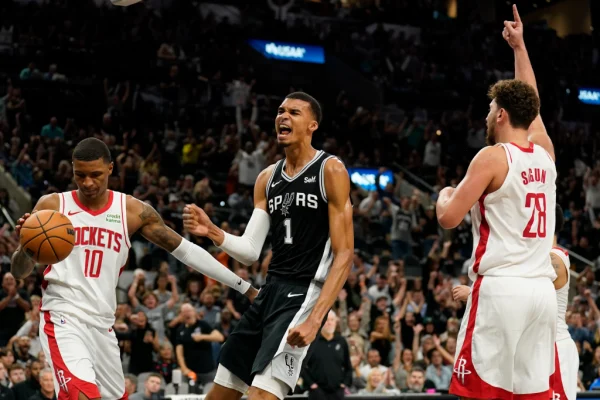Gym Class: “Dead Weight”
An opinion piece on why gym class should not be a requirement.
Every day students look at the chalkboard to find out what they will be doing in class.
Published editorials reflect the views of the author in the by-line and not necessarily the staff, administration, or student body.
The goal of Phys. Ed. is described as “facilitating students in improving their quality of life through promotion of life-long, health-enhancing physical activity.” There is no doubt that this is a respectable goal, and there definitely are important life skills that can be learned from gym class, when executed well.
The problem arises when many students see it as the most dreaded part of their school day and put minimal effort in.
As I was running around in circles on a gravel path in the blazing hot sun having my heart rate monitored, I couldn’t help but think to myself: “Why do I have to do this?” The school day is already stressful enough without a class where you are forced to push your body to its physical limits and get berated if you don’t. I was sure a lot of my other classmates felt this way, too, so I conducted a poll asking people if they liked gym class. 165 people from many different school districts voted, and 80% of them stated that they are not happy with gym class. Isn’t that a problem?
When a class is not considered part of the core academic curriculum and isn’t something every student has an interest in, it is considered an elective. Considering a big chunk of students feels an aversion towards gym class and it is not a core academic subject, I strongly believe that gym class should be an elective.
I understand that the main reason Phys. Ed. is a required class is so that students can get time in the day to exercise, and many believe that required gym class will help the obesity epidemic that has been plaguing America for years. But here’s the objective: People who don’t like exercising outside of gym class, will not exercise IN gym class.
I conducted another poll asking people if they put their best effort into gym class. Out of 185 people, 65% of them said they do not. I’ve seen it in my own gym class, too: People standing in the corner during warm-ups hoping the teacher won’t notice, people lying about how many laps they completed during a mile, and even people hiding behind bushes to get out of running. If most people aren’t devoted to gym class, what is the point of having it? Teachers can threaten students with failing grades, but they can’t force them to participate. People who don’t like exercising outside of school, will not exercise in school.
The state of Illinois is one of the only states in the U.S. that requires K-12 physical education. The state of Illinois is also ranked 10th in the country for childhood obesity. Pennsylvania, a state that does not require K-12 physical education, is ranked 4 places below Illinois. Obesity won’t be solved by 40 minutes of fake exercising every other day.


Source: stateofobesity.org/high-school-obesity
The graph above shows obesity rates in high schoolers in Illinois (K-12 Phys. Ed. required), and the graph below shows obesity rates in high schoolers in Pennsylvania (K-12 Phys. Ed. required).
North Allegheny offers advanced gym, where people choose to take gym every day. In advanced gym, all the students put in effort and try their best. If gym was an elective and people that wanted to take it were the only ones who took it, wouldn’t that be better for everyone? The students who dislike gym would not have to take it, the teachers would have enthusiastic students, and students who like gym could be with fellow students who will push each other to be their best.
Many people, especially nonathletic people, feel that they are pressured and often embarrassed in gym class. Everyone has different levels of athleticism, and when students are told that they must or should be able to do something such as lift a certain amount of weight, it leads to them feeling insecure and like they can’t participate. Grouping together kids of all different levels of athleticism and expecting them to perform the same leads to a lot of shame. “I really dislike gym because I’m not athletic by any means so I feel like I’m pressured by everyone around me to do good when I’m miserable,” said Ava Broadbent, sophomore.
In an academic class, students cannot see each other’s work, but in gym class, everything is out there in the open. Gym teachers try to tell students that the class is a team who will not judge each other, but it’s not that simple. You can’t group people of different athletic abilities and social groups and expect them to all work together as one jolly, happy team.
Kids can be cruel. They do notice when a person doesn’t have a partner to work with, but they won’t do anything about it. They do notice when a teacher is yelling at a person for not having a high enough heart rate. When kids who have no interest in athletics are forced to partake in physical education with more athletic people, they feel humiliated and it creates negative memories associated with physical education, making them not want to participate even more.
Even some student athletes find that they dislike gym. Student athletes already get their exercise through their sport, and they find that gym tires them and even affects how they play for their team. “I have gym ninth period so I have to do the twenty minute run and then go right to practice,” said Chelsea Boyer, who plays for the volleyball team. Student athletes already get their exercise, and there is absolutely no reason why they should be forced to do another 40 minutes of exercise that would exhaust them for their sport.
Some student athletes actually feel as if the Phys. Ed. curriculum is not challenging enough for them and just serves as busy work. “For me, gym class adds another factor that I have to consider regarding my athletic performance,” said Graham Wolfe, who runs for the varsity cross country team.
Gym class can also serve as a potential injury risk for athletes. More than 60,000 students a year are hurt during gym class. A few years ago, a star football player from Hampton broke his ankle playing dodgeball in gym class and he was not able to play for the football team anymore. All of the hard work he and the football team put in was destroyed in a matter of seconds for a single gym class. Phys Ed. can serve as a challenge not only for non-athletes, but student athletes, too.
Many of the skills that are supposed to be taught in gym class can be taught in health class and middle school gym. Students leave middle school and health class with a solid understanding and foundation to leading a healthy life, and by the time students are in high school, they should be old enough to make the decision for themselves. Without gym, students would have an extra half credit that they could use to take a class they enjoy.
Gym class can definitely prepare you for your future career if you are interested in a career in athletics, but not everyone can find the information taught in class useful in preparing them for their future. Many students find themselves in their senior year, not knowing what they want to do, and if schools were to offer more opportunities for students to take classes they have an interest in, it would make things a lot easier.
For some people, gym class is something they look forward to and enjoy. For some, it is a class that they dread. If gym class was an elective, it would benefit both people who enjoy gym and people who don’t. The people that enjoy gym could still have it, be with people who are just as passionate about it as them, and the teachers would have more motivated, enthusiastic students. The people who do not like gym would not have to take it and could use that credit towards something that they enjoy and could help them in their future career path. Every student has the right to learn what they want in school and be in an environment that supports them and their needs. Forcing gym class upon students is doing the opposite of that.

Sally Cho is a sophomore at NAI and is very excited to be writing for NAEye this year. Outside of writing, she enjoys theatre, playing the piano, and volunteering...







